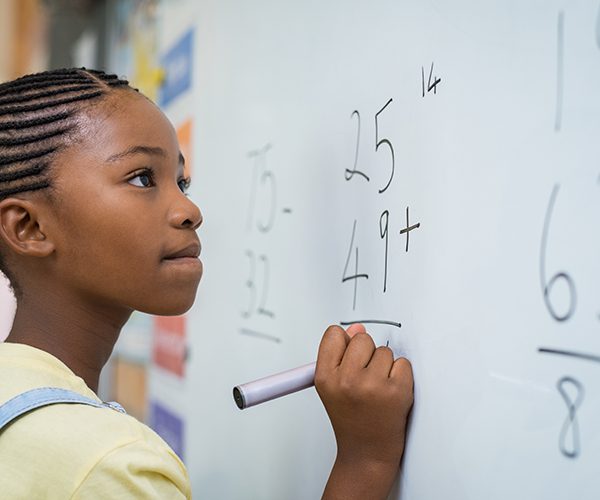What’s Math Got to Do with It?
It’s clear that math education and mathematics itself are core to social justice

When we think about social justice issues, what comes to mind? Racial equality, LGBTQ+ rights, gun violence, access to health care, maybe even literacy. It’s not likely that mathematics would make anyone’s top ten list.
But, once you look below the surface, it’s clear that math education and mathematics itself are core to social justice.
First, students’ trajectories through math classes disproportionately affect their future opportunities. But factors known at birth are highly predictive of that trajectory, including whether a student will ever take calculus. Consider race: Among high school graduates, 46% of Asian Americans have completed calculus, compared with 18% of white graduates, 9% of Latino graduates, and 6% of Black graduates. With 89% of college admissions officers saying that students who take high school calculus are more likely to succeed in college, that is a social justice issue.
Secondly, while justice involves values, it also entails measurement. Whether the topic is college access, COVID deaths, policing, food insecurity, or the gender pay gap, math — including statistics — is key to understanding social outcomes. Our values guide us in interpreting specific disparities in death rates, arrest rates, or pay levels. Math tells us what those rates, levels, and disparities are. If we need mathematics to evaluate social conditions, then a mathematically proficient population is key to ensuring social justice.
Seen this way, depriving students of rigorous mathematical preparation not only limits their educational and career opportunities but also constitutes a form of disenfranchisement as it interferes with their ability to exercise their political rights.
As Dan Fink said it powerfully in the documentary “Counted Out,”
“Everyone belongs in the field of mathematics. Everyone is capable of mathematical thinking, and not only that, it is something that can enrich everyone’s life. I don’t think it’s just something that everyone can do. It’s something that everyone deserves. I think it’s something that everyone already owns. It’s like an inheritance you get just for being human.”
Currently, our education system is not ensuring that every child receives this inheritance. Math teaching needs to prioritize social justice in terms of educational outcomes. Teaching math in a social justice context is one way to engage more students, especially minoritized students, and produce more equitable outcomes.
This requires a more expansive approach to quantitative reasoning. The algebra-intensive math content traditionally emphasized in school is effective for solving for unknowns or modeling systems that change. Statistics and data science involve asking questions, collecting or accessing real-life data, analyzing that data, and interpreting the results — approaches that are increasingly relevant in the data-rich world we inhabit, though often de-emphasized in schools.
Both algebra and statistics are fundamental to students’ ability to understand and critique the world. And both can be taught in ways that are relevant to social justice. A book for teachers from the National Council of Teachers of Mathematics includes algebra lessons on topics such as climate change, income inequality, and living wages. Statistics lessons include an exercise about the 2020 Census, an examination of test scores by zip code, and an analysis of racial justice in policing.
The Algebra Project, founded by civil rights icon Bob Moses, recognizes how real-world experiences foster deeper math learning. Participating students — teens who might not otherwise have access to college-preparatory math classes — participate in a shared concrete event, such as a subway ride, and use it to model mathematical concepts.
“While mastery of computations and algorithms is useful, true math literacy extends far beyond that,” note Algebra Project leaders in the organization’s latest newsletter. “An intuitive, logical, creative, and exploratory mindset transforms mathematics from a memorization game to an active practice.”
Sadly, some critics deride such approaches as less than rigorous. Subway rides and social justice are beside the point, they argue, and might invite miscalculation or imprecision.
But, as I’ve written elsewhere, to claim that doing math is more than correctly solving math problems is not to say that precision doesn’t matter. It’s more like stating that good writing goes beyond accurate spelling and grammar. Just like teaching spelling and grammar does not teach students to write (and it certainly doesn’t motivate many students to be writers), teaching students to calculate or perform mathematical procedures is not enough to ensure that students can think and reason mathematically.
The study of English literature doesn’t prioritize the number of paragraphs a student can write in 20 minutes. Mathematical learning shouldn’t be limited to memorizing procedures and solving equations under timed conditions.
Unlike the humanities, mathematics and other STEM fields have a veneer of being neutral or value-free. Perhaps the tendency to teach math in decontextualized ways helps explain why high SAT verbal scores are correlated with political participation, while high SAT math scores predict decreased levels of participation.
That needs to change.
According to Harvard’s Danielle Allen, the original purpose of education was to prepare democratically engaged citizens. And math is among the disciplines that are necessary to that endeavor: “To make judgments about the course of human events and our government’s role in them, we need history, anthropology, cultural studies, economics, political science, sociology, and psychology, not to mention math—especially the statistical reasoning necessary for probabilistic judgment—and science,” she notes.
If mathematics is central to social justice, those of us who care about social justice cannot afford to leave math education out of the equation. And we certainly cannot leave mathematics in the hands of those for whom social justice is not a priority.
Pamela Burdman is executive director of Just Equations, a policy institute that reconceptualizes the role of math in education equity.